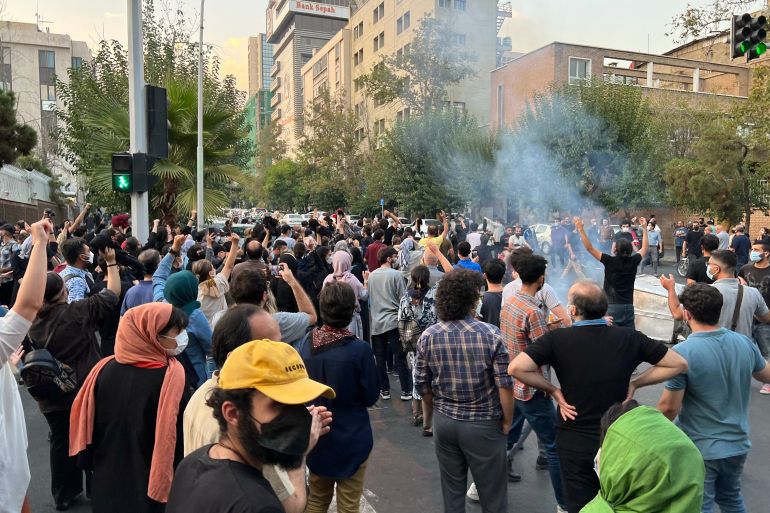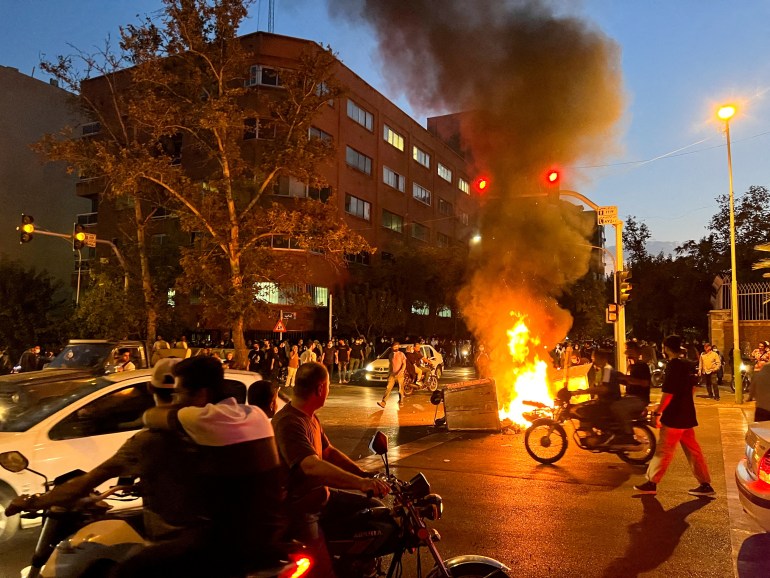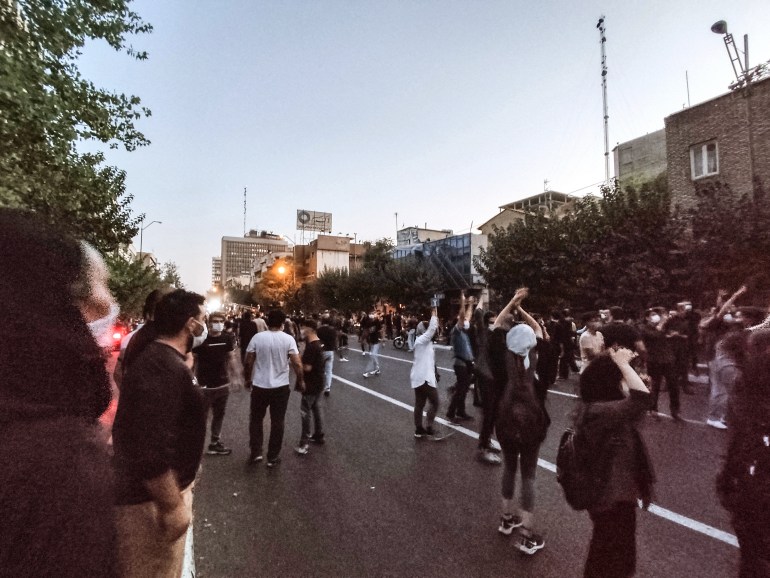Iranian leaders hold meeting as protests enter fourth week
Iranian state television’s feed was hijacked for a few seconds in support of the protests in many cities on Saturday.

Tehran, Iran – The leaders of three branches of power in Iran held a meeting as protests that erupted across the country over the death of Mahsa Amini in police custody entered a fourth week.
President Ebrahim Raisi sat down with parliament speaker Mohammad Bagher Ghalibaf and judiciary chief Gholam-Hossein Mohseni Ejei in the presidential building in Tehran late on Saturday to emphasise the need for “security and calm” to sustain the country’s economy and people’s livelihoods.
Keep reading
list of 4 itemsCanada barring entry to IRGC members in new Iran sanctions push
Iranian coroner denies Mahsa Amini died from blows to body
US issues more Iran sanctions over crackdown on protests
“At the moment, the Iranian society needs unity among all groups regardless of language, religion or ethnicity to overcome hostility and division by Iran’s enemies,” a short statement published on the president’s website said.
The capital Tehran and cities across the country saw continued unrest on Saturday as internet restrictions imposed several weeks ago remained in place.In spite of the restrictions, videos continued to circulate on social media on Sunday and – in addition to several major neighbourhoods across the capital – showed protests in Sanandaj, Isfahan, Karaj, Rasht and Shiraz among others.

Iran’s state television feed was hijacked by a hacker group for several seconds late on Saturday, with a call to protest and chanting of the prevalent “woman, life, freedom” slogan. Images of Amini and three other young women whose deaths have made headlines in recent weeks were also displayed.
The state-run IRNA news website confirmed that protests were held in universities in Tehran, Arak, Zanjan, Hamedan, Mashhad, Bushehr, Gilan, Kerman and other cities, with some students taking off their hijabs and chanting anti-establishment slogans.
School students have also featured prominently in videos circulating on social media in recent days, with some girls taking off their hijabs and chanting inside and outside schools. All schools and universities in the Kurdistan province, where the 22-year-old Amini was from, were shut down on Sunday after several cities saw major protests.
Protests have been most intense in Sanandaj, the capital of the province, where a gruesome video circulating on social media on Saturday showed the passenger of a car being gunned down in a city street in the afternoon. Foreign-based media and a Kurdish rights group said the young man was killed by security forces but a police official said “anti-revolutionaries” killed him.
State media reported one member of the Islamic Revolutionary Guard Corps (IRGC) was killed in Sanandaj on Saturday. One member of the Basij paramilitary force was also reported killed in Tehran. Dozens of protesters and security forces are thought to have been killed with many more arrested, but no official tally has been released.
Iranian authorities have denounced the demonstrations as “riots” guided by foreign powers, and have organised several counter-demonstrations in support of the state across the country. The IRGC has been pounding what it has called positions held by “terrorist” separatist Kurdish groups in neighbouring Iraq’s northern parts.
The force on Saturday said its artillery, missile and drone attacks – which it promised will continue if the groups remain a threat – have killed 30 “terrorists” and wounded 200 others.
Meanwhile, the death of two teenage girls has dominated the news in recent days. Nika Shakarami died in Tehran after participating in the protests and going missing for 10 days just before her 17th birthday. Sarina Esmailzadeh was also 16 when she died late last month in Karaj.
Foreign-based Persian-language media and rights groups have reported they were both killed by security forces during the protests, but Iranian authorities claimed Shakarami died after falling from the roof of a building near her home while Esmailzadeh – a YouTuber and vlogger – killed herself by throwing herself off the roof of a family home.

Earlier this week, a report by the coroner’s office in Tehran on the death of Amini created more controversy as it said the young woman died because of a history of underlying illnesses and not by any blows to the head or vital organs.
Amini was arrested last month in Tehran by the so-called “morality police” for improper hijab, and footage aired by state television showed she collapsed in a police “re-education” centre after suffering an apparent heart attack. She fell into a coma and died three days later, on September 16, in a hospital.
Her family rejects authorities’ claims that she was not beaten and suffered from pre-existing conditions, and called for their own trusted experts to evaluate her autopsy reports.
A lawmaker said on Saturday the report on Amini’s death will be finalised in the parliament by Tuesday. Amini’s family has so far rejected requests by lawmakers to go to the parliament and discuss her death.
International reaction
As the protests continue in Iran, there have also been demonstrations overseas and foreign governments continue to react. Demonstrations in support of the protests in Iran have been held in dozens of cities across the world, with the latest in Canada’s Vancouver on Saturday.
The Canadian government on Friday said it is blacklisting about 10,000 members of the IRGC, which Prime Minister Justin Trudeau called a “terrorist” organisation but did not formally designate as such. Canada joined the US in imposing sanctions against Iranian authorities, and the European Union has also said it is considering human rights sanctions.
Tehran has condemned the moves as “foreign intervention” and says it will respond if the EU imposes sanctions. At least nine foreign nationals have been arrested during the protests, according to Iranian officials. Several European nations have called on their citizens to leave Iran and refrain from travelling to the country.
Meanwhile, a large number of foreign celebrities, fashion brands, and even football clubs have expressed solidarity with protesters in Iran.
Singers Dua Lipa and Hozier have been some of the latest figures to post about the issue on their social media accounts, and a group of prominent French actresses, including Oscar winners Juliette Binoche and Marion Cotillard, filmed themselves chopping off locks of their hair in support of the protesters.